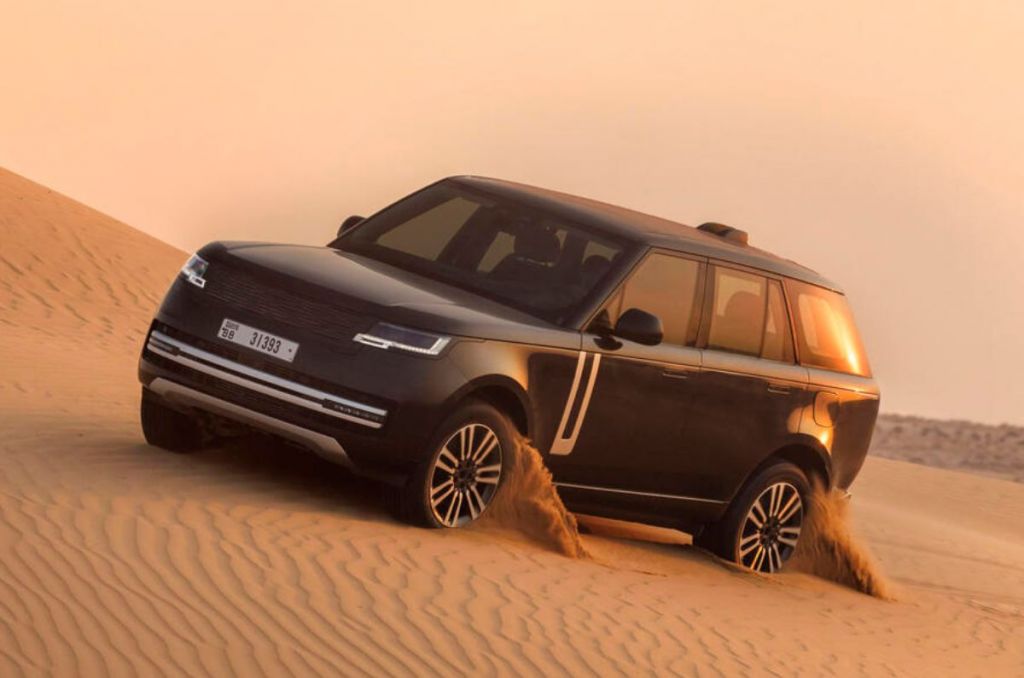
- Range Rover Electric was earlier tested in the Arctic circle
- Tests in the UAE are done with temperatures of more than 50 degrees
- JLR likely to build EVs in India in future
Range Rover Electric technical details
The testing conducted in the UAE follows the tests done earlier this year in the Arctic Circle. In the latest round of tests, the Range Rover electric is being evaluated at temperatures of as high as 50 degrees with humidity levels of 90 percent.
One of the key reasons for JLR to test the Range Rover electric in these conditions, besides their off-road tech, is the new thermal management system, which the brand says is the most intelligent ever fitted to a Range Rover. The brand further adds that this system could cope with the heat “in pursuit of maximum client cabin comfort”. JLR has gone on record and confirmed that all cars surpassed expectations.

Test mules of the Range Rover electric are also being thrown up Big Red, a 300ft sand dune in the heart of Sharjah’s Al Badayer desert, to test the EV’s new Intelligent Torque Management system, which replaces a conventional ABS-based traction control system.
This is claimed to improve traction control off-road by diverting power to each electric motor to reduce torque reaction time from around 100 milliseconds to as little as one millisecond. JLR says after five continuous attempts, none of the cars demonstrated any fall in performance.
JLR previously highlighted that this is the first car to use a battery and electric drive unit assembled in-house. However, no specific technical details or performance figures have yet been given beyond the earlier confirmation that it will use an 800V charging architecture.
JLR has also earlier said the new Range Rover electric will have the same “go-anywhere” capability as the ICE-powered SUV, with a pledge that it will offer towing, wading and all-terrain capability that will exceed any other luxury electric SUV – including the ability to wade through 850mm-deep water.

The hint that the Range Rover electric will offer performance “comparable” to the existing V8 suggests a total output close to the 530hp that the model offers. It’s expected to adopt a dual-motor tech, which will allow for greater four-wheel-drive ability and systems such as torque vectoring to boost its off-road potential. JLR said its test programme has been adapted to examine the vehicle’s underfloor, battery durability and thermal derating in particular..
The Range Rover electric will be built in Solihull, UK, alongside the existing mild-hybrid and PHEV versions. It will initially use batteries from a third-party supplier before eventually switching to packs produced in the new Somerset gigafactory that JLR parent firm Tata is planning.
Range Rover Electric design and styling
Painted all in black and without the contrasting matt trim elements that JLR has previously suggested will mark out the EV powertrain, the prototype looks all but identical to the ICE Range Rover that has been on sale since 2022.

JLR said this shows how the prototype's "modernist design language stays true to the Range Rover bloodline", suggesting that the Range Rover Electric – as it is officially named – will only be subtly differentiated from the straight-six, V8 and plug-in hybrid derivatives.
JLR to build EVs in India at new Chennai plant
Tata Motors had signed a Memorandum of Understanding (MoU) with the Tamil Nadu government to invest Rs 9,000 crore in the state to set up an EV plant. The plant is likely to come up at Ranipet, and sources say that the manufacturer could use it to produce Jaguar Land Rover EVs. Additionally, Autocar India has learnt that beyond manufacturing EVs for JLR, the Tata Group is also looking at moving some of the ICE model production of JLR to India, given the demands of EU and UK legislation that may pose a challenge to manufacture IC engines there.
Also See:
New Audi Q5 Sportback revealed with petrol, diesel engine options
Aston Martin Vantage Roadster, Vanquish India launch in 2025